
Find Help
More Items From Ergsy search
-
Why is blood donation history important in preventing disease transmission?
Relevance: 100%
-
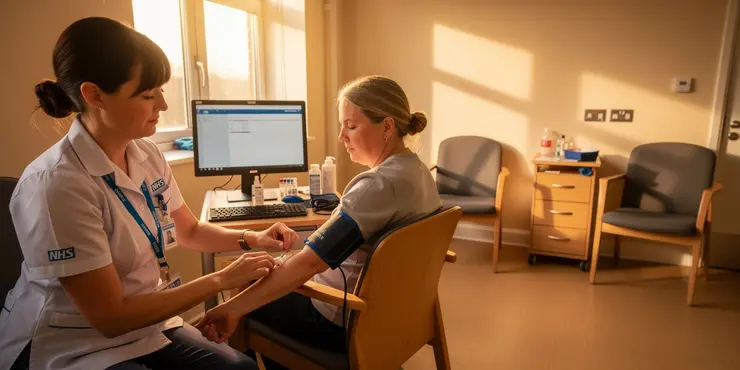
How is blood screened to prevent disease transmission?
Relevance: 86%
-

What measures are taken to prevent disease transmission in blood transfusions?
Relevance: 81%
-
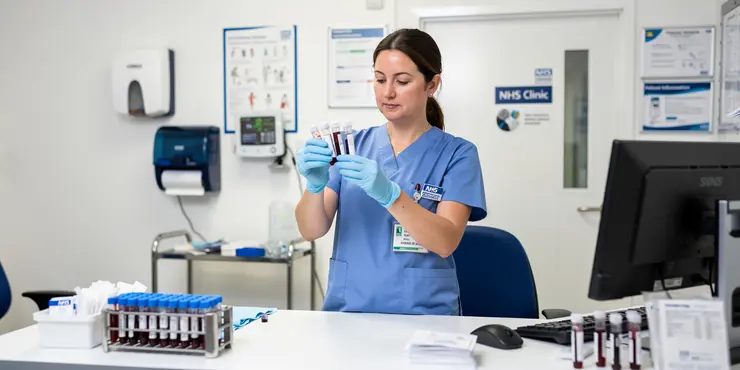
What other viruses are tested for in blood donations?
Relevance: 73%
-
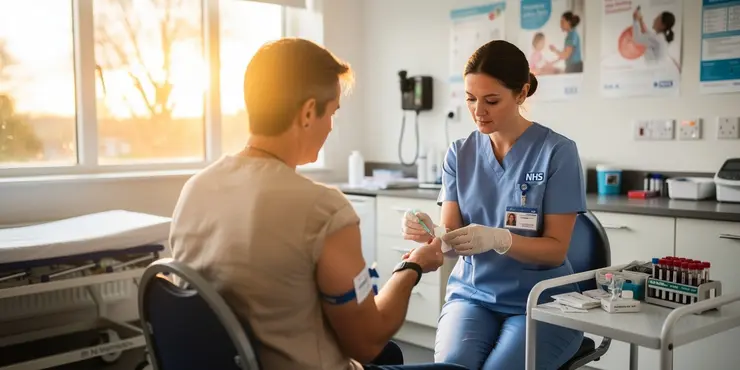
Is Chagas disease a concern with blood transfusions?
Relevance: 69%
-

What diseases can be spread by blood transfusions?
Relevance: 68%
-
Can you get any prion diseases from blood transfusion?
Relevance: 62%
-

Can you donate blood specifically for a friend or family member?
Relevance: 58%
-
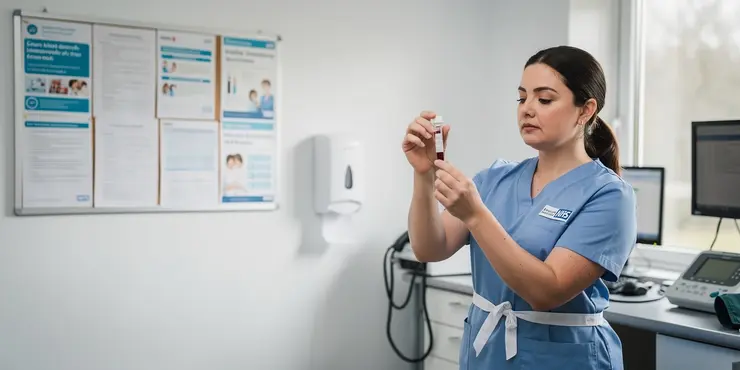
What is the most common disease transmitted by blood transfusion?
Relevance: 56%
-

Are there any parasites that can be transmitted through blood transfusions?
Relevance: 55%
-
Is malaria still a concern for blood transfusion safety?
Relevance: 55%
-

Can syphilis be transmitted via blood transfusion?
Relevance: 55%
-
Can Dengue fever be transmitted through blood transfusions?
Relevance: 53%
-

Is Hepatitis B a risk in blood transfusions?
Relevance: 53%
-

Is HTLV a risk in blood transfusions?
Relevance: 52%
-
Is Zika virus screened for in blood transfusions?
Relevance: 50%
-
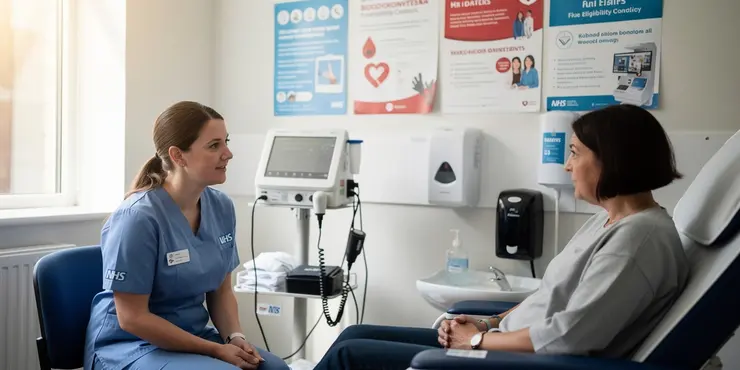
Can COVID-19 be transmitted through blood transfusions?
Relevance: 50%
-
Can HIV be transmitted through blood transfusions?
Relevance: 49%
-
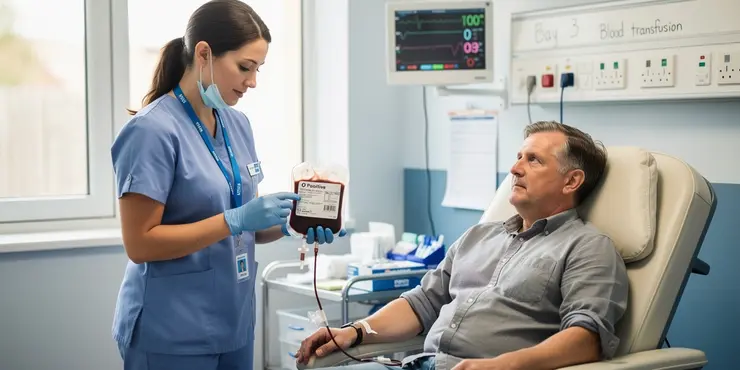
Blood Transfusion
Relevance: 47%
-
What is a blood transfusion?
Relevance: 42%
-
Blood Product Transfusions
Relevance: 41%
-

Are new variants more transmissible?
Relevance: 41%
-
Are new emerging pathogens a risk for blood safety?
Relevance: 40%
-
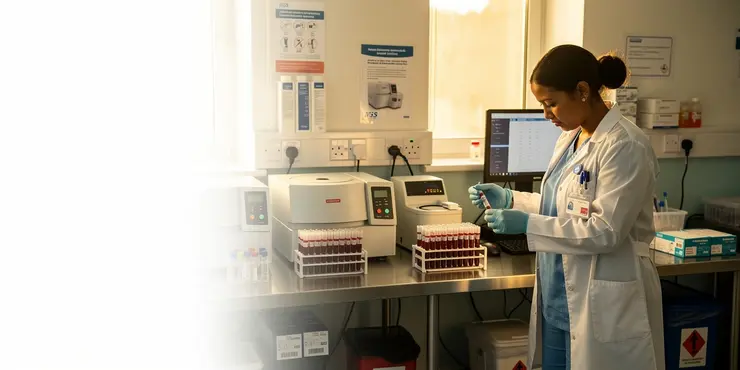
How do healthcare providers match blood for transfusions?
Relevance: 38%
-

How can charitable donations affect Inheritance Tax?
Relevance: 38%
-
Can bacterial infections be transmitted through blood transfusion?
Relevance: 37%
-

Kidney transplant waiting stories – DJ Ace and Lauren | NHS Organ Donation
Relevance: 37%
-
What are some common reasons blood transfusions are needed?
Relevance: 36%
-

How is Lyme disease transmitted?
Relevance: 36%
-
Why might someone need a blood transfusion?
Relevance: 36%
-

Are there risks associated with blood transfusions?
Relevance: 34%
-

What role do fruit bats play in Nipah Virus transmission?
Relevance: 33%
-

Can Marburg virus disease be prevented?
Relevance: 32%
-
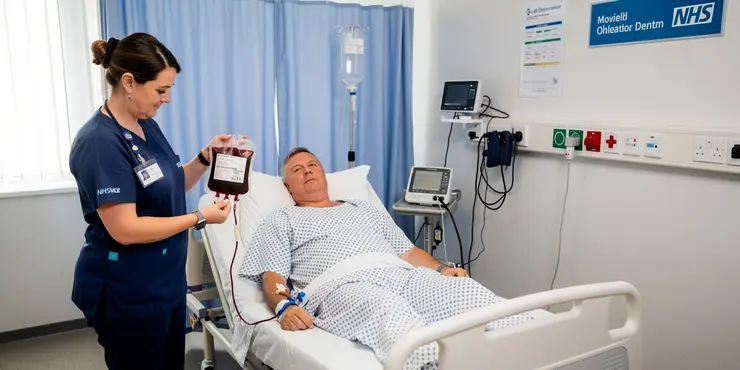
What types of blood products can be transfused?
Relevance: 32%
-

What is sickle cell disease?
Relevance: 31%
-
Can people of any blood type receive a transfusion of any blood type?
Relevance: 31%
-
Can certain medical conditions prevent receiving blood transfusions?
Relevance: 30%
-

Is Lyme disease contagious between humans?
Relevance: 30%
-
Is blood used for transfusions safe?
Relevance: 30%
-
Do all mosquitoes in the UK carry diseases?
Relevance: 29%
Introduction
Blood donation is a critical component of healthcare systems worldwide, including the United Kingdom. It plays an essential role in saving lives by providing necessary blood components to patients in need. However, ensuring the safety of the blood supply is paramount, as blood can be a medium for transmitting infectious diseases. Therefore, blood donation history carries substantial importance in preventing disease transmission.
Screening and Safety Measures
In the UK, stringent measures are in place to ensure the safety of blood donations. The donation process includes a rigorous screening of potential donors to assess their eligibility. This involves a detailed questionnaire concerning the donor's health history, lifestyle, travel history, and previous donations. By maintaining an accurate blood donation history, healthcare providers can effectively screen and exclude donors who might pose a risk of disease transmission.
Identifying Risk Factors
Blood donation history helps in identifying individuals who have risk factors for certain infections. Factors such as recent travel to areas with endemic diseases, high-risk behaviours, or previous infections can disqualify a person from donating blood temporarily or permanently. By capturing this information, blood services can prevent the collection of potentially infectious blood, thereby safeguarding the blood supply.
Tracing and Managing Infections
A comprehensive donation history aids in tracing and managing infections if contamination is suspected. Should a recipient develop an infection post-transfusion, healthcare providers can trace the blood back to the donor. This historical data is crucial for investigating the source of infection, managing the donor appropriately, and preventing further donations until it is safe to do so.
Advancements in Testing and Technology
Technological advancements have significantly improved the screening and testing of blood donations. Despite these advancements, a robust donation history remains vital. There are windows during which newly contracted infections might not be detectable by tests. Donation history provides an additional layer of defence, particularly in cases where infections might be recent and undetectable at the time of donation.
Conclusion
In conclusion, maintaining a detailed blood donation history is vital for preventing disease transmission in the UK. It serves as an essential tool for screening potential donors, identifying risk factors, tracing infections, and enhancing the overall safety of the blood supply. Its importance is reinforced by advancements in blood testing technology, highlighting the necessity of integrating historical records with modern scientific methods to protect public health.
Introduction
Donating blood helps save lives. It's very important in healthcare. But, to keep everyone safe, we must make sure the blood is free from diseases. Knowing the history of blood donations helps stop diseases from spreading.
Keeping Blood Safe
In the UK, we have strong rules to keep blood donations safe. Before someone can donate, they answer questions about their health and lifestyle. This helps to see if they can donate safely. By knowing the history of donations, we can stop people who might have diseases from donating.
Finding Risks
Knowing about past donations helps find people who might have diseases. If someone has traveled to a place with lots of sicknesses or has been sick before, they might not be able to donate. This helps keep the blood safe for others.
Tracking Infections
If someone gets sick after getting a blood transfusion, knowing the donation history helps track where it came from. This helps doctors find and fix the problem quickly.
New Technology Helps
New technology makes testing blood better. But, knowing the history of donations still helps a lot. Sometimes, new diseases can't be found right away by tests. Knowing the history adds extra safety.
Conclusion
In summary, knowing the history of blood donations is very important. It helps keep blood safe for everyone. Even with new technology, keeping track of past donations helps protect people's health.
Frequently Asked Questions
Why is blood donation history important?
Blood donation history helps track any potential disease exposure, ensuring safe blood supply.
How does blood donation history prevent disease transmission?
It helps identify donors who may carry infectious diseases, preventing contaminated blood from being used.
What diseases can be tracked through blood donation history?
Diseases like HIV, Hepatitis B and C, and syphilis can be tracked through donor history.
Are blood donors screened for diseases before donation?
Yes, donors undergo tests for various infections to ensure their blood is safe for transfusion.
What role does blood donation history play in public health?
It aids in monitoring and controlling the spread of infectious diseases through blood transfusion networks.
Can blood donation history help in tracking emerging diseases?
Yes, it can help identify and respond to newly recognized infectious threats quickly.
How often is blood donation history updated?
Every time a donor gives blood, their donation history is updated to reflect new tests and results.
What information is recorded in a blood donation history?
Information such as previous donation dates, test results, and any deferral reasons are recorded.
Why might a person be deferred from donating blood?
Deferrals can occur due to risk factors like recent travel, illness, or risky behavior identified in their history.
Is blood donation history confidential?
Yes, it's kept confidential and used only for ensuring the safety of the blood supply.
How can inconsistencies in blood donation history affect disease prevention?
Inconsistencies can lead to incorrect assessments of risk, possibly allowing unsafe blood to be transfused.
Why is a regular review of blood donation history crucial?
Regular reviews ensure the latest health information is considered for donor eligibility and disease prevention.
What happens if a disease is detected during blood donation screening?
The donor is notified, their donation is discarded, and further testing or treatment may be recommended.
Can blood donation history influence future screening protocols?
Yes, patterns in donation history can lead to updated protocols to improve safety measures.
How does a change in global disease patterns affect blood donation history?
It can influence which diseases are tested for and alter donor screening criteria based on new risks.
Do technological advancements impact blood donation history and disease tracking?
Advancements improve testing accuracy and data management, enhancing disease tracking capabilities.
What are the limitations of relying solely on blood donation history for disease prevention?
It may not capture all risk factors or new diseases not yet included in screening protocols.
How do blood banks ensure the integrity of donation history data?
They maintain strict data collection and privacy protocols to ensure accurate and secure records.
Can past donations affect donor eligibility?
Yes, past donations indicating previous infections or risk behavior can lead to temporary or permanent deferral.
Why is accurate self-reporting important in blood donation history?
Accurate self-reporting by donors helps identify potential risks, reinforcing safe blood supply practices.
Why is it important to know your blood donation history?
It's good to know about your past blood donations. Here's why:
- Safety: It helps doctors know if it's safe for you to give blood again.
- Health: You can check if your body is healthy enough for donating blood.
- Help others: Knowing your history makes sure your blood can help people who need it.
If reading is hard, you can use these tips:
- Ask someone to read with you.
- Look at pictures or videos about blood donation.
- Use a screen reader to read the text out loud.
When you give blood, doctors keep a record of it. This helps them make sure the blood is safe and healthy.
How does giving blood help stop diseases?
It helps find out if donors have illnesses that can spread. This stops bad blood from being used.
What illnesses can we find by looking at blood donation history?
We can find out about illnesses like HIV, Hepatitis B and C, and syphilis from a person's donation history.
Do doctors check for sickness before people give blood?
Yes, people who give blood have tests to check if they have any infections. This makes sure their blood is safe for others.
Why is it important to know about blood donations?
Knowing who gives blood helps keep people healthy. Blood is used to help sick people get better.
If we know who gives blood, we can make sure there is enough for everyone.
Using pictures or videos about blood donations can help us understand better.
It helps keep track of and stop the spread of germs and sickness through blood donations.
Can keeping track of blood donations help find new diseases?
When people give blood, doctors keep records. These records can show patterns. They might help doctors see if new sicknesses are starting.
Helpful tools:
- Ask a doctor or nurse if you have questions about giving blood.
- Use simple charts or pictures to understand how blood donation works.
- Watch videos about blood donations and diseases to learn more.
Yes, it can help us find and deal with new germs or viruses fast.
How often do they update your blood donation record?
Every time someone gives blood, we write down what happened in their record. This shows all the new tests and results from their donation.
What do they write down when you give blood?
We write down when you gave blood before, the test results, and why you couldn't give blood if you were not allowed.
Why might someone not be able to give blood?
Some people can't give blood for a while. This can happen for different reasons. Here are some reasons why you might have to wait to give blood:
- You might be sick or just got better from being sick.
- You might have a cut or injury that is not healed yet.
- You could have traveled to another country recently.
- Sometimes you need to wait after getting a shot or vaccine.
If you are not sure, ask a nurse or doctor. They can help you understand. Reading with a friend or listening to audiobooks can also help.
Sometimes, people have to wait before they can do something because of things that might be risky. This can happen if they have traveled somewhere, if they are not feeling well, or if they have done something that might not be safe.
Is blood donation private?
Your blood donation history is kept secret. This means no one can see your donation records except the people who need to know, like doctors. Keeping this private helps protect your information.
If reading is hard, you can ask someone you trust to help you understand. You can also use tools like text-to-speech if you like listening to information. This way, you can make sure you know what is happening with your blood donation.
Yes, we keep it a secret. We only use it to make sure the blood is safe.
How can mixed-up blood donation records affect stopping diseases?
When people give blood, it's important to have correct records of their donations.
If the records are wrong or mixed up, it can be hard to see if there are any problems or diseases.
To help, people can use reminder tools to track donation dates and keep information in one place.
If we don't check the blood the same way every time, we might make mistakes. This could mean giving bad blood to people, which is not safe.
Why is it important to check your blood donation history often?
We check health information often. This helps us know who can be a donor and how to prevent sickness.
What happens if we find a disease when checking your blood donation?
We tell the donor. We throw away the donation. We might suggest more testing or treatment.
Can giving blood change how doctors check your health in the future?
Yes, patterns in giving money can help make new rules to keep things safe.
How do changes in world sickness patterns change blood donation history?
Big changes in how diseases spread around the world can affect how people donate blood. When new sicknesses appear, rules about who can give blood might change. This is to keep everyone safe.
Helpful Tip: Try using pictures or videos to learn more about this topic. You can also ask someone to explain it to you in simple words.
It can change which sicknesses we check for and how we choose donors because of new dangers.
Do new technologies change how we track blood donations and diseases?
New technologies can make tracking blood donations easier and better.
They can also help us find diseases faster and more accurately.
This means healthier blood donations and better care for everyone.
New tools help make test results better and help keep track of information, which makes it easier to see how diseases are spreading.
What are the problems if we only use blood donation records to stop diseases?
It might not find all risks or new illnesses that are not checked yet.
How do blood banks keep donation records safe and correct?
Blood banks work hard to make sure all the information about blood donations is right. They use special computer programs to help with this job. These programs keep track of who gave blood, when they did it, and if their blood is healthy.
Here are some things blood banks do to keep the records safe:
- They use computers that have passwords. Only people who are allowed can see or change the information.
- They check the information regularly to make sure it is correct and up-to-date.
- They have backup copies of the information in case something happens to the computers.
- They train workers to be careful and follow rules when handling the information.
If you find reading hard, you can ask someone you trust to explain this to you, or use reading tools that can help make reading easier.
They have strong rules to keep your information correct and safe.
Do past gifts change if you can donate again?
Yes, if you gave blood before and it shows that you might have been sick or might have done risky things, you might have to wait or not give blood anymore.
Why is it important to tell the truth about your blood donation history?
Telling the truth about your blood donations is very important. This helps to keep everyone safe.
Here are some tips to help you:
- Ask for Help: If you don't understand a question, ask someone to explain.
- Take Your Time: You don't need to rush. Think about your answers.
- Talk to a Nurse: If you are unsure, nurses can help you.
When people who give blood tell the truth about their health, it helps keep the blood safe. This is because we can find and fix any problems. This makes sure the blood is good and safe for everyone who needs it.
Useful Links
This website offers general information and is not a substitute for professional advice.
Always seek guidance from qualified professionals.
If you have any medical concerns or need urgent help, contact a healthcare professional or emergency services immediately.
Some of this content was generated with AI assistance. We’ve done our best to keep it accurate, helpful, and human-friendly.
- Ergsy carfully checks the information in the videos we provide here.
- Videos shown by Youtube after a video has completed, have NOT been reviewed by ERGSY.
- To view, click the arrow in centre of video.
- Most of the videos you find here will have subtitles and/or closed captions available.
- You may need to turn these on, and choose your preferred language.
- Go to the video you'd like to watch.
- If closed captions (CC) are available, settings will be visible on the bottom right of the video player.
- To turn on Captions, click settings .
- To turn off Captions, click settings again.
More Items From Ergsy search
-
Why is blood donation history important in preventing disease transmission?
Relevance: 100%
-

How is blood screened to prevent disease transmission?
Relevance: 86%
-

What measures are taken to prevent disease transmission in blood transfusions?
Relevance: 81%
-

What other viruses are tested for in blood donations?
Relevance: 73%
-

Is Chagas disease a concern with blood transfusions?
Relevance: 69%
-

What diseases can be spread by blood transfusions?
Relevance: 68%
-
Can you get any prion diseases from blood transfusion?
Relevance: 62%
-

Can you donate blood specifically for a friend or family member?
Relevance: 58%
-

What is the most common disease transmitted by blood transfusion?
Relevance: 56%
-

Are there any parasites that can be transmitted through blood transfusions?
Relevance: 55%
-
Is malaria still a concern for blood transfusion safety?
Relevance: 55%
-

Can syphilis be transmitted via blood transfusion?
Relevance: 55%
-
Can Dengue fever be transmitted through blood transfusions?
Relevance: 53%
-

Is Hepatitis B a risk in blood transfusions?
Relevance: 53%
-

Is HTLV a risk in blood transfusions?
Relevance: 52%
-
Is Zika virus screened for in blood transfusions?
Relevance: 50%
-

Can COVID-19 be transmitted through blood transfusions?
Relevance: 50%
-
Can HIV be transmitted through blood transfusions?
Relevance: 49%
-

Blood Transfusion
Relevance: 47%
-
What is a blood transfusion?
Relevance: 42%
-
Blood Product Transfusions
Relevance: 41%
-

Are new variants more transmissible?
Relevance: 41%
-
Are new emerging pathogens a risk for blood safety?
Relevance: 40%
-

How do healthcare providers match blood for transfusions?
Relevance: 38%
-

How can charitable donations affect Inheritance Tax?
Relevance: 38%
-
Can bacterial infections be transmitted through blood transfusion?
Relevance: 37%
-

Kidney transplant waiting stories – DJ Ace and Lauren | NHS Organ Donation
Relevance: 37%
-
What are some common reasons blood transfusions are needed?
Relevance: 36%
-

How is Lyme disease transmitted?
Relevance: 36%
-
Why might someone need a blood transfusion?
Relevance: 36%
-

Are there risks associated with blood transfusions?
Relevance: 34%
-

What role do fruit bats play in Nipah Virus transmission?
Relevance: 33%
-

Can Marburg virus disease be prevented?
Relevance: 32%
-

What types of blood products can be transfused?
Relevance: 32%
-

What is sickle cell disease?
Relevance: 31%
-
Can people of any blood type receive a transfusion of any blood type?
Relevance: 31%
-
Can certain medical conditions prevent receiving blood transfusions?
Relevance: 30%
-

Is Lyme disease contagious between humans?
Relevance: 30%
-
Is blood used for transfusions safe?
Relevance: 30%
-
Do all mosquitoes in the UK carry diseases?
Relevance: 29%


